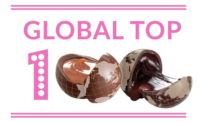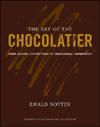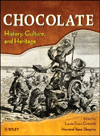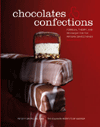COVID-19 pandemic offers European candy companies opportunities to grow
List ranks top confectionery companies in Europe.
.jpg?1670344891)
European confectioners are getting back on track after almost two years of ups and downs. Despite closures, candy companies have been resilient, using the time to change business models, build new facilities, upgrade online tools, and expand product lines.
“Chocolate is a crisis-proof product,” says Rausch spokesperson Fenja Zwisele. The German chocolatier notes having a stronger focus on online business and local cooperation with partners has helped them get through this pandemic.
It’s no surprise Ferrero is No. 1 in our new “Top European Confectioneries” list at $14.5 billion, followed by Nestlé at $7.78 billion and Lindt & Sprüngli at $5.18 billion. Yet about a third of the 55 companies on the list are from Germany. According to the Association of the German Confectionery Industry (BDSI), Germany exports 2.2 million tons of confectionery with a value of €8.5 billion (over $10 billion) annually.
The pandemic helped German gummy maker Mederer “to become a more efficient global business structure,” according to Eric Plautz, president of Mederer of North America Inc. “Coming out of ‘the crisis’ has been the latest endeavor as global supply chain issues and the reopening of countries has stretched companies operationally. This is a good problem to have but solving this will be the next critical step that will again change the way we do business for years to come.”
Germany’s Alfred Ritter saw double-digit growth with its 100-gram (3.5-oz.) bar market in its home country, which helped compensate for losses in the travel-retail sector, according to a company press release.
“In times of crisis, established brands such as ours are at an advantage as retail tends to focus on the top products in each category,” writes CEO Andreas Ronken.
Other areas of Europe also saw growth. Lindt & Sprüngli, of Switzerland, had a 17.4 percent increase in the first half of 2021 over last year.
UK’s Hotel Chocolat saw a 21 percent increase in sales with its fiscal year 2021 ending in June at £165 million ($226 million). The maker of chocolates and chocolate liquors grew its UK database by 66 percent to 3 million since December 2019, making its digital and subscription sales the largest part of the group’s revenues, according to a company newsletter.
“Our goal of becoming the most tech-activated chocolate brand is moving forward in leaps and bounds and is already helping to power our major achievements and future growth,” says CEO Angus Thirlwell.
Hotel Chocolat’s investment in growth includes adding three new production lines: a fourth truffle making line, a second Velvetiser flake line for home drinks subscription, and an enlarged bean-to-bar chocolate facility for super-premium fine cacao pods and vegan chocolate. Hotel Chocolat also has expanded its distribution center by over 90,000 sq. ft. to 207,000 sq. ft. The company expects to create over 250 jobs this year.
Loacker has compensated losses in the away-from-home channels (including company stores), with gains in the at-home channels in Italy, as well as with substantial international growth in key regions such as the United States, Canada, the UK, Israel, Egypt, China, Japan, and Australia.
“Considerable e-commerce growth was a common phenomenon across many of our key countries and regions,” says Loacker’s Executive Chairman Ulrich Zuenelli. “We’ve so far been able to navigate pretty well through the pandemic. As a result of the discipline of the whole team, we have been able to keep supply chain and operations up and running at all times.”
Loacker kept busy creating a new logo and packaging design that uses 15 percent less plastic and forming a new communications platform and campaign. “We used the time of the pandemic for preparing for our sustainability efforts, comprehensive brand relaunch, as well as the launch of many innovations to boost the relevance and attractiveness of the Loacker brand to the consumer and thus to propel our sales in the years to come.”
The company also improved and reformulated recipes to provide more variety, using higher shares of natural flavorings and less sugar. These products are GMO-free and have a cleaner label. New wafer varieties include Matcha, Double Chocolate, Cheese, and the seasonal varieties Cinnamon, Gingerbread, and Speculoos–Orange. The new THINS wafer line and Premium Patisserie Specialties include Tortina Triple Chocolate, Tortina Caramel, a new premium Patisserie Snack Bar line, and a new Premium Biscuit line in Nut Selection, Snowflake, and Chip Chocolate.
Loacker’s website says it has sales of €346.5 million, but this includes non-confectionery items. Zuenelli says its confectionery sales are around $330 million. Loacker also owns a new GMO-free Alpine milk spray drying plant, a joint venture with a cooperative of dairy farmers in South Tyrol, Northern Italy, where Loacker took the industrial lead. “Indeed, via our spray drying plant, even the milk of the cows of the farmers of our headquarters mountain literally finds its way into our chocolate and cremes,” he says.
Austria’s PEZ Group also is estimating double-digit growth for 2021, according to spokesperson Beth Coscia. “2020 was a challenging year for some of our product categories which were impacted by worldwide retail closures,” she notes. “However, due to our broad product portfolio, including the healthy supplement products we sell outside of the U.S., the PEZ Group had a good year under the difficult circumstances.”
Liisa Eerola, v.p. of communications at Fazer Confectionery, said all the company’s markets were impacted by the COVID-19 pandemic. Most severely affected were Fazer’s retail business, cafes, and bakery shops.
“On-the-go categories declined as consumers reduced their everyday traveling and commuting,” Eerola adds. “Thanks to several efficiency improvement initiatives and the agility and professionalism of our people, we were able to ensure business continuity, help society and support our customers. The resilience that our business showed, in combination with our profitability improvement efforts, especially in the bakery businesses in Russia and Sweden, resulted in good financial performance for 2020. Our net sales remained stable at the previous year’s level and our profitability improved.”
The chocolate market in Ukraine saw varying effects in different segments, according to Jane Stupak, of Millennium Chocolate Factory. “Mostly, the pandemic influenced people with low income and as a result, cheap segment decreased accordingly,” she says. “At the same time, premium segment increased. Probably, the people with middle and higher-income started to spend more money in the supermarkets and for traveling purposes.”
To increase company profits, she notes new Millennium Chocolate is introducing new products in the middle and higher market segments. Irrespective of the pandemic, she says the market has not grown as a whole, but the company has seen growth due to the investments in new equipment and new products.
Läderach – chocolatier suisse has used this time as opportunity to improve and refine online offerings while expanding globally, according to company spokesperson Ryan Bowling. “While other brands pivoted to online-only … we have more than 30 Läderach stores set to open by the end of this year across the United States.”
In an asset purchase agreement signed on Valentine’s Day, Läderach took over the leases of 34 Godiva locations in the United States, which began in June and will continue through the end of the year in California, Florida, Massachusetts, New York, Texas, Washington D.C., and Virginia. They also expanded into Harrods’ Chocolate Hall this past spring.
“We’ve already seen the way people are shopping has invariably changed through necessity, but we expect some habits of these to stay,” Bowling says. “Reports have demonstrated that consumers are spending more money on quality food and drink and luxury products, and when it comes to chocolate, this looks to continue beyond the pandemic as more considered choices are made to make consumption more of an occasion.”
Other European confectionery companies did not fare as well.
“(Josef) Manner is certainly not a crisis winner if you look at the business results,” says Karin Steinhart, spokesperson from the Austrian confectioner. “In the areas of our Manner shops in particular, there were no tourists and, unfortunately, they are still absent for an indefinite period of time.”
Steinhart notes without events and tourism, chocolate “souvenirs” took a hit, especially with Manner’s Ildefonso and Victor Schmidt Mozartkugeln. “We are cautiously optimistic and are entering the cold season with numerous innovations such as our winter waffles in three varieties a la ‘Speculatius,’ baked apple-cinnamon and roasted almonds.”
Dieter Schafer, of Gubor Group, known colloquially as Ruebezahl & Riegelein, adds, “We are experiencing slight declines in turnover but are trying to compensate for this through growth with new products and growth in exports by our customers.”
Private investors from the family shareholders circle of the Ruebezahl & Riegelein Group acquired ice cream and confectionery manufacturer Eichetti this summer for an undisclosed amount. Eichetti, founded in 1897, is based in Werneck, Germany, had between 70 and 90 employees, and sold about €10 million a year. The Eichetti plant will stay in ownership of those shareholders.
Gubor had closed its Riegelein factory in the Czech Republic, but this new acquisition keeps its number of plants at seven.
Italy’s ICAM had “extraordinary performances” in 2020, which it believes are due to a “cutting-edge business model,” says Luca Barindelli, company spokesperson. The Orsenigo-based company saw increases in both private label and industry sectors, which helped compensate for decreases in proprietary brands, Vanini, ICAM Professionale, and Agostoni.
“A figure that in hindsight is not surprising at all, if you think of the enormous impact that large-scale distribution has had on the lives of people in Italy and abroad during the months of the most rigid lockdown and the consoling effect for mind and body that the chocolate has on human being,” Barindelli notes. “For months, large-scale distribution stores have been the only possible escape valve for millions of people locked up at home, places where they can recover not only basic necessities but also food, such as chocolate, which play an important role in psycho-physical wellbeing.”
In Spain, Valor Chocolates saw exponential growth in its chocolate bar line since the pandemic began. It also saw growth in its Huesitos brand during quarantine.
“According to sales, there was a greater demand from the retailers during this period, since consumers were going through difficult times and needed to indulge themselves, and good chocolate is always a good way of doing it,” says a statement from the Villajoyosa chocolate manufacturer. “In addition, as the confinement became longer, many people also reconsidered the importance of a balanced diet. This also favored the consumption of our products, mostly dark chocolates, with high percentages of cocoa, nuts and with no sugars.”
According to Communications Manager Lea Sorensen Holm, Toms Gruppen only “suffered” in the travel retail sector during the lockdowns. “But the sector is picking up again,” she notes. “The Danish market as well as export markets have shown good results.”
Toms, of Ballerup, Denmark, which also trades as Anthon Berg A/S, opened a state-of-the-art production facility in Nowa Sol, Poland, at the end of 2020 after closing a three-story plant in the heart of Bremen, Germany. “This presented significant limitations for optimizing our production and adding capacity,” says Holms. “The new factory in Nowa Sol, Poland, has been built with a state-of-the-art design and options for growth. It is furthermore in an optimal location in relation to our packing facility in Poland and in relation to our German and Northern European markets.”
Toms, which installed Annette Zeipel as CEO in February, added to its signature line of liquor-filled chocolate bottles with a new collection of cognac. This complements its Single Malts Scotch Collection, Chocolate Coffee Liqueurs, and Chocolate Cocktails lines.
Alfred Ritter also opened a new production facility in Breitenbrunn, Austria, in January. As part of an asset deal with Mars, Alfred Ritter acquired the Amicelli brand, a wafer roll with hazelnut cream coated in milk chocolate in assorted sizes.
HARIBO is expecting production to begin at its new plant in Pleasant Prairie, Wisconsin in 2023. Its first North American factory will be one of the largest in the confectionery industry. In phase one of construction, there will be over 300 career opportunities available.
“In a challenging year with a worldwide pandemic, our global business structure has proven to be a great advantage,” Haribo said in a news release. “Consumers found moments of respite and childlike happiness through HARIBO treats when they needed it most. Like most global brands, we are navigating challenges but have learned how agile we can be, and we know our success is because of our engaged associates.”
This year, HARIBO introduced new products, including Funtastic Mix, limited-time Summer Edition Goldbears, Z!NG Sour Kicks, and Rainbow Worms.
Goran Lovrek, of Kras Food Industry, Zagreb, Croatia, says the pandemic impacted how the company organized its workforce, especially in production and logistics where remote work is not possible.
“A number of measures have been employed to ensure the safety of the workers and we are glad that they have proved to be successful,” Lovrek says.
When remote work was not possible, Kras employees organized in teams that did not mingle and had backups for critical positions. Beside temperature checks and free testing, the company gave paid leave to those with symptoms or potential contact to encourage responsible behavior.
In other news, five Migros Industry companies, all in Switzerland, including Chocolat Frey AG, merged in June to create Delica AG. The headquarters will remain in Buchs, and all existing locations remain operational. The other consortium of companies that will now merge under the Delica AG umbrella include Midor AG, Riseria AG, and Total Capsule Solutions, which sell coffee, ice cream, baked goods, and snacking products in addition to confectioneries.
Chocolats Halba/Sunray, of Prattein, Switzerland, changed its name to HALBA, a division of Coop Cooperative, in March. Chocolats Halba and Sunray merged in 2017 to have “one voice, one brand” and now is a $330 million business. Andreas Hasler came on board in 2019. In addition to changing its corporate identity and corporate design, HALBA has a new website as well, www.halba.ch.
Also in March, Mag. Andreas Kutil became the new CEO of Josef Manner. He started his career at Kraft Foods (prior to becoming Mondelēz) in 1997 as a key account manager in the chocolate sector, later taking over the entire Austrian confectionery distribution. In 2009, he became managing director of Mondelēz Austria, and in the same year, he also became vice president of the Austrian Association of Branded Goods and served on the Federal Board of Directors of the Austrian Federation of Industrialists. In 2018, Kutil began serving as director of European Growth Projects in the Swiss head office of Mondelēz.
Last December, Oliver Schindler, owner of the German company Ragolds, purchased 50 percent of the shares of a production plant owned by the Dutch company Continental Candy Industry Netherlands (CCI). Schindler and his business partner are calling their new company Inworld GmbH. Although separate, Inworld is expected to produce a profit for Ragolds.
Finally, Valeo Foods is now sharing just its confectionery sales of €465 million ($549 million). Previously, the group only shared its total sales online at €1.2 billion.
Looking for a reprint of this article?
From high-res PDFs to custom plaques, order your copy today!



_900x550.jpg?height=200&t=1670344885&width=200)




